How to Conduct a Criminal Background Check in New Jersey: A Step-by-Step Guide

Introduction to Criminal Background Check in New Jersey
A criminal background check serves as a tool to gather and assess an individual’s criminal history, offering critical insights into any previous criminal activity. These checks have become integral to many aspects of personal and professional life, ensuring safety, compliance with laws, and minimizing risks. In New Jersey, criminal background checks are a key part of the decision-making process for a wide variety of institutions, including employers, landlords, and government agencies. The checks help organizations assess the suitability of individuals for particular roles, services, or housing based on their past criminal behavior, or the lack thereof.
What is a Criminal Background Check, and Why Is It Essential in New Jersey?
A criminal background check is essentially a detailed report that includes an individual’s criminal history, ranging from arrests and convictions to pending cases. The report typically includes both local and national criminal records, and can also involve other public records such as sex offender registries. Criminal background checks are an essential tool for many organizations to ensure they are making informed decisions based on reliable information about a person’s past.
In New Jersey, these checks are pivotal for protecting both businesses and the general public. Employers, landlords, educational institutions, and government entities frequently use these checks to ensure that individuals do not pose risks to others, be it in the workplace, at home, or in other areas of society. By ensuring that applicants or tenants have a clean criminal history, these organizations can mitigate potential risks, such as theft, fraud, workplace violence, or other harmful activities.
For instance, employers in certain industries are required by law to perform criminal background checks to ensure the safety of both their employees and clients. The same applies to landlords who wish to verify that tenants have no history of criminal activities that could jeopardize the safety of the property or other tenants.
Who Conducts Criminal Background Checks in New Jersey?
The responsibility of conducting a criminal background check typically falls on various organizations, each with specific requirements and purposes. Here are the key entities that frequently conduct background checks in New Jersey:
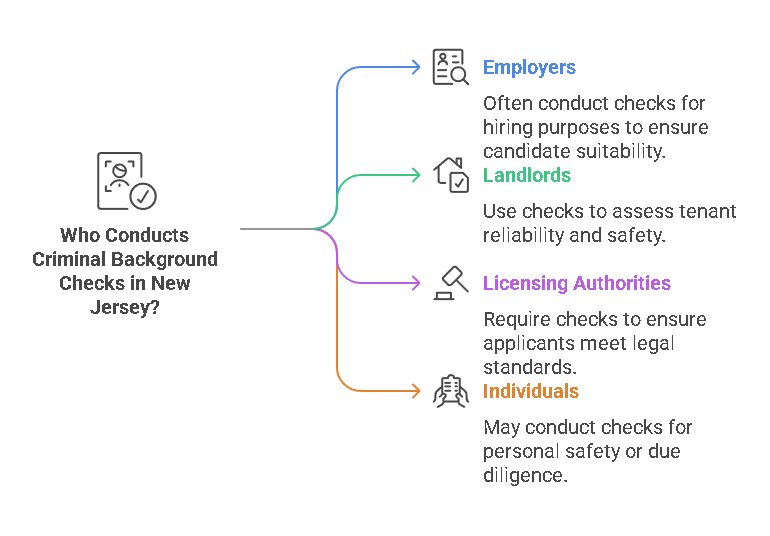
1. Employers
Employers in New Jersey often require criminal background checks to assess a potential employee’s history before making hiring decisions. The checks ensure that job candidates meet the company’s ethical and security standards. Specific industries, such as healthcare, childcare, financial services, and education, often have more stringent requirements due to the sensitive nature of the work. For example, healthcare workers, educators, and childcare providers are often required to undergo more comprehensive checks to safeguard vulnerable populations.
Employers also rely on criminal background checks as part of the hiring process to assess risk factors that could affect workplace safety, company culture, or the security of the company’s assets. For example, positions that involve handling money, working with children, or interacting with vulnerable populations may require background checks to prevent fraud, violence, or abuse.
2. Landlords and Property Managers
Criminal background checks are commonly used by landlords and property managers in New Jersey to screen prospective tenants. This helps ensure that individuals renting homes or apartments do not pose a risk to the property, neighbors, or the community. When considering an applicant, landlords want to avoid renting to individuals with histories of violent crimes, drug abuse, or property damage. As such, landlords may require tenants to submit to background checks before agreeing to a lease.
New Jersey’s laws on rental housing stipulate that landlords cannot automatically reject applicants with criminal records but must take other factors into account, such as the severity and recency of the crime. This ensures that people who may have reformed their behavior after past offenses still have a fair chance at securing housing.
3. Government Agencies
Government agencies at the local, state, and federal levels also rely on criminal background checks for various purposes. In New Jersey, agencies may require background checks for individuals applying for certain public service roles, public housing assistance, or government benefits. The state’s strict regulations ensure that public service workers and individuals receiving public support meet the moral standards necessary to serve the public.
Additionally, criminal background checks are essential when New Jersey residents apply for licenses to work in certain industries, such as real estate, healthcare, and law enforcement. The state mandates that anyone applying for these licenses undergo a comprehensive background screening to ensure that only qualified and trustworthy individuals are granted the authority to perform specific duties.
4. Licensing and Regulatory Bodies
In New Jersey, certain industries require professionals to pass background checks before they are allowed to practice or operate. Regulatory bodies in these industries, such as the New Jersey Division of Consumer Affairs for contractors or New Jersey State Board of Nursing, perform background checks to ensure that licensed professionals adhere to ethical standards and do not have a criminal history that could disqualify them from offering their services.
5. Educational Institutions
In the educational sector, background checks are routinely required for faculty, staff, and volunteers working in schools, daycare centers, and other child-focused environments. New Jersey law requires that anyone working directly with children undergo a criminal background check to ensure they do not pose a threat to the safety and wellbeing of students. This is especially critical for roles such as teachers, bus drivers, school counselors, and janitors.
The Process of Obtaining a Criminal Background Check in New Jersey
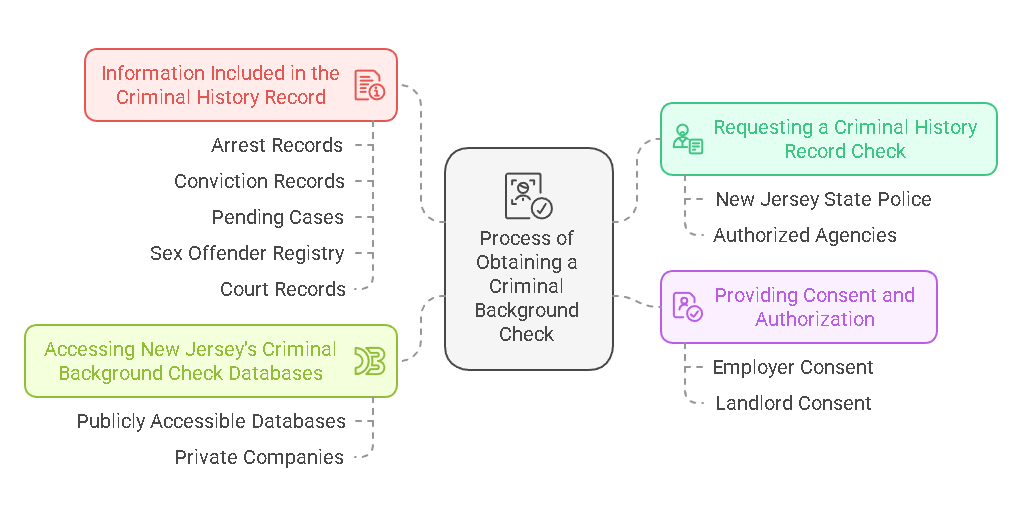
The process for obtaining a criminal background check in New Jersey involves several essential steps. Whether you’re an individual seeking to obtain your own background check or an organization looking to conduct one on an applicant, the process is fairly straightforward but requires attention to detail and compliance with state regulations.
1. Requesting a Criminal History Record Check
To initiate a criminal background check in New Jersey, individuals or organizations must submit a request through the New Jersey State Police or another authorized agency. The New Jersey State Police provide a centralized database of criminal history records, which can be accessed through the New Jersey Criminal History Records Information system.
Requests can typically be made online, in person, or by mail. When requesting a background check, applicants must provide identifying information, such as full name, date of birth, and any other relevant personal details. This ensures the correct individual is being checked and helps avoid any confusion or errors in the report.
2. Providing Consent and Authorization
Criminal background checks in New Jersey generally require the individual’s consent. This is particularly important for employers, landlords, and other entities who need permission before conducting a check. Consent forms must be completed and signed before any investigation into an individual’s criminal history can take place. The form typically includes a release that allows the organization to check local, state, and federal databases for criminal information.
3. Information Included in the Criminal History Record
Criminal background checks in New Jersey include a range of information, such as:
- Arrest Records: A detailed list of any arrests, including the date and type of crime involved.
- Conviction Records: Information about past criminal convictions, including charges, sentences, and whether the conviction was for a felony or misdemeanor.
- Pending Cases: A record of any ongoing investigations, court cases, or unresolved charges.
- Sex Offender Registry: Whether the individual is listed on the state or federal sex offender registry.
- Court Records: Details about court appearances, case outcomes, and judicial decisions related to the individual.
4. Accessing New Jersey’s Criminal Background Check Databases
Criminal background checks can be conducted through the New Jersey State Police or by utilizing other authorized private companies that work with New Jersey’s criminal databases. Publicly accessible databases provide a convenient method for obtaining criminal history reports, though certain restrictions may apply depending on the purpose of the check and the entity conducting it.
State-Specific Regulations for Criminal Background Checks in New Jersey
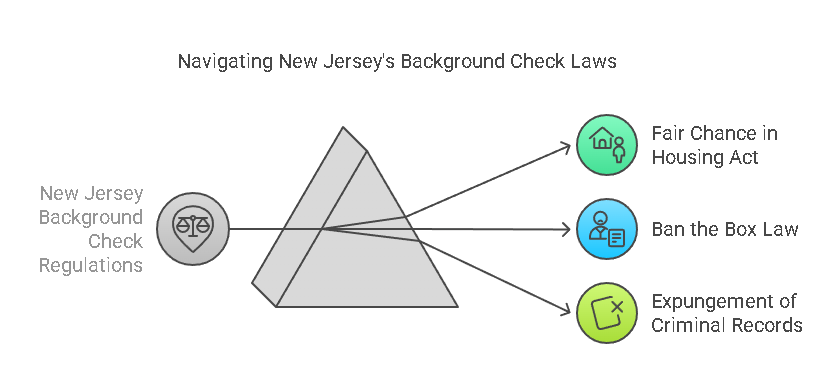
New Jersey has strict rules and regulations surrounding criminal background checks, aimed at ensuring fairness and protecting individual rights while also promoting public safety. Below are some notable regulations that govern background checks in the state:
1. The Fair Chance in Housing Act
Under New Jersey’s Fair Chance in Housing Act, landlords are prohibited from rejecting tenants solely based on their criminal history. They must take other factors into account, such as the age of the offense, the individual’s rehabilitation efforts, and any other relevant context. This law ensures that individuals who may have reformed after serving their sentence aren’t unfairly denied housing opportunities.
2. The Ban the Box Law
New Jersey’s Ban the Box Law limits the ability of employers to inquire about an applicant’s criminal history during the early stages of the hiring process. Employers must remove any questions about criminal records from job applications. However, employers can still conduct criminal background checks at later stages of the hiring process, but they must comply with guidelines on how and when to use criminal records in employment decisions.
3. Expungement of Criminal Records
New Jersey provides a process for individuals to have certain criminal records expunged, or removed, from public databases. Expunged records are not included in a criminal background check. However, expungement is not available for all types of crimes, and the process can be complex, involving legal petitions and court hearings.
The Process and Benefits of Criminal Background Checks in New Jersey
Criminal background checks are vital tools for ensuring safety, legal compliance, and informed decision-making for employers, landlords, and other entities in New Jersey. In this section, we’ll take a deep dive into the process of conducting criminal background checks, the legal requirements, the benefits of these checks, and common challenges and misconceptions surrounding them. Additionally, we will compare New Jersey’s background check process with that of other states, highlight the services provided by PreciseHire, and explain how businesses can navigate this process more efficiently.
Step-by-Step Guide to Conducting a Criminal Background Check in New Jersey
Conducting a criminal background check in New Jersey involves several critical steps that help ensure compliance with state and federal laws while respecting individuals’ privacy rights. The process can vary depending on the nature of the background check (for employment, housing, licensing, etc.), but the following general steps apply:
1. Obtain Consent from the Individual
Before initiating a criminal background check, it is essential to obtain written consent from the individual undergoing the check. Both the Fair Credit Reporting Act (FCRA) and New Jersey state laws require consent before a background check is conducted, ensuring the individual is aware of the process.
2. Choose the Type of Background Check
The background check may be either local (focused on a specific municipality or county) or statewide (examining criminal records across New Jersey). The type chosen depends on the needs of the requesting entity, such as employers, landlords, or government agencies.
3. Submit the Request
Once consent is obtained and the type of background check is chosen, the next step is submitting the request. This can be done through several methods:
- Online Platforms: New Jersey State Police provides an online portal for requesting criminal background checks.
- In-Person Requests: Local police stations or county courthouses may be visited for specific requests.
- Mail-In Requests: Some entities prefer submitting requests by mail to the relevant authorities.
4. Review the Results
The results typically contain information regarding arrests, convictions, or pending charges. Employers and landlords must carefully review this information to ensure its accuracy. Incorrect or outdated information should be flagged and corrected through a dispute process.
5. Follow Legal Requirements
In New Jersey, laws like Ban the Box and guidelines surrounding the use of expunged records must be followed. Employers, for instance, cannot inquire about criminal history during the initial job application process and must be cautious when considering applicants with expunged records.
Legal Requirements and Compliance with Federal and State Laws
New Jersey’s criminal background check process is governed by several legal frameworks, ensuring that the process is fair and non-discriminatory. Compliance with these laws is crucial for avoiding legal consequences:
1. Fair Credit Reporting Act (FCRA)
The FCRA regulates the use of consumer information, including criminal records. It mandates that background checks be conducted fairly and that individuals are informed when criminal history is used in decisions related to employment or housing. In cases where adverse action is taken based on a criminal background check, the individual must be provided with a Pre-Adverse Action Notice.
2. New Jersey’s Ban the Box Law
New Jersey’s Ban the Box law prohibits employers from asking about an applicant’s criminal history on initial job applications. This is to prevent discrimination based on criminal records before the applicant has had a chance to demonstrate their qualifications.
3. Expungement of Criminal Records
New Jersey allows individuals to apply for the expungement of certain criminal records, which legally removes them from public databases. Expunged records do not appear on background checks, providing individuals with a fresh start when seeking employment or housing.
Benefits of Criminal Background Checks in New Jersey
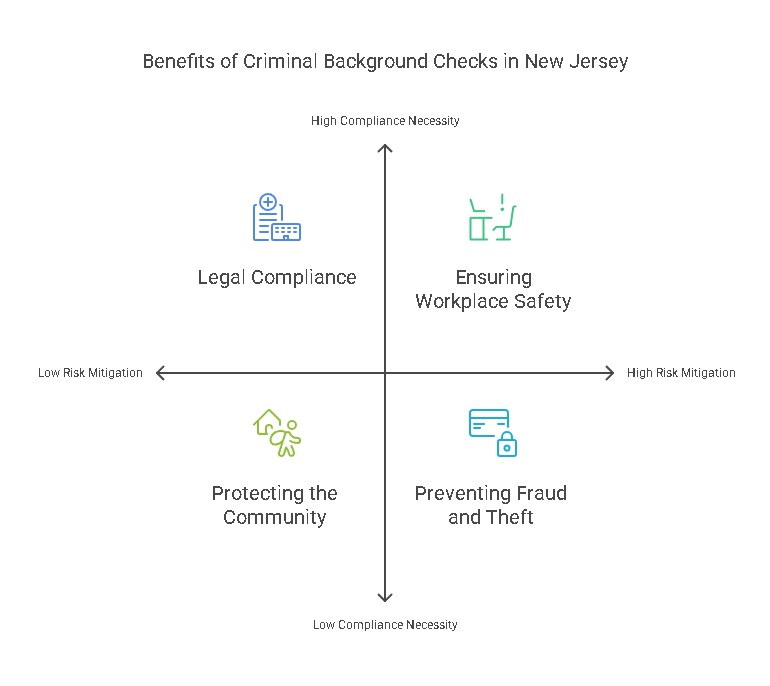
The use of criminal background checks provides a variety of benefits for employers, landlords, and organizations in New Jersey. By conducting these checks, businesses can mitigate risks, maintain a safe environment, and stay compliant with legal requirements.
1. Ensuring Workplace Safety
Criminal background checks help businesses ensure the safety of their employees, customers, and clients. By screening potential hires for violent crimes, theft, or fraud, businesses can avoid hiring individuals who might pose a risk to workplace safety.
2. Preventing Fraud and Theft
In positions that involve access to sensitive information, finances, or assets, background checks are crucial for mitigating the risk of fraud or theft. Employers can check for past offenses such as embezzlement, financial crimes, or identity theft.
3. Legal Compliance
Certain industries, such as healthcare, education, and childcare, require employers to conduct criminal background checks as part of their regulatory compliance. New Jersey also requires background checks for certain professional licenses and rental housing.
4. Protecting the Community
For landlords, criminal background checks help ensure that tenants with a history of violent crime or property damage are not granted access to housing. This helps protect the safety of other tenants and the community.
Common Challenges and Misconceptions About Criminal Background Checks
While criminal background checks are an invaluable tool, they are not without their challenges. Some common issues and misconceptions include:
1. False Positives
False positives can occur when an individual’s criminal record is incorrectly identified due to common names or clerical errors. This can lead to wrongful rejection of job applications or rental opportunities. Employers and landlords should verify the accuracy of the background check results.
2. Misunderstanding Expunged Records
There is often confusion about expunged records. Expunged criminal records should not appear on background checks; however, they may sometimes show up erroneously. It’s important for employers and landlords to understand that these records are legally erased and should not factor into decision-making.
3. Variability Across States
Criminal background check processes differ across states. What is permissible in one state may not be allowed in another. New Jersey’s strict laws regarding the use of criminal records and expunged information set it apart from other states with more lenient regulations.
Comparison of Criminal Background Check Processes: New Jersey vs. Other States
The following table compares the criminal background check process in New Jersey with that of other states:
| Aspect | New Jersey | Other States |
|---|---|---|
| Consent Requirement | Written consent required before checks. | Written consent required in most states. |
| Ban the Box Law | Yes, prohibits early criminal history inquiry in employment. | Varies by state, many states have similar laws. |
| Expungement of Criminal Records | Expunged records must be excluded from background checks. | Expungement laws vary, but records may still be accessible in some states. |
| Type of Checks (Local vs. Statewide) | Both local and statewide checks available. | Similar processes, but some states may focus only on statewide checks. |
| Timeliness of Results | Typically 3-5 business days, depending on the method. | Varies by state, but generally similar timelines. |
| Adverse Action Notifications | Required if an adverse decision is based on the criminal record. | Federal law requires this, but states may have additional requirements. |
How PreciseHire Can Help You
Navigating the complexities of criminal background checks can be daunting, especially for businesses that need to stay compliant with New Jersey’s regulations. PreciseHire simplifies this process by offering businesses a streamlined background screening service that ensures compliance with all federal and state laws, including New Jersey’s specific requirements.
PreciseHire specializes in background checks for employers, landlords, and other organizations in New Jersey. Our services help companies manage risk, ensure workplace safety, and make informed decisions. With a focus on accuracy, efficiency, and compliance, PreciseHire can assist your organization in obtaining the necessary criminal records while adhering to New Jersey’s legal guidelines, including the proper handling of expunged records and Ban the Box laws.
We provide a comprehensive suite of background screening services, including:
- Criminal history checks
- Employment verification
- Tenant screening
- Compliance consultation
By choosing PreciseHire, you can streamline your hiring and screening processes, reduce risks associated with negligent hiring, and ensure your business remains compliant with the latest regulations.
Legal Aspects, FAQs, and Conclusion
In this final section, we’ll dive into the legal considerations associated with criminal background checks in New Jersey, address common questions surrounding the process, and summarize the key takeaways. We’ll also discuss how businesses and organizations can utilize background checks while staying compliant with state and federal laws.
Legal Considerations When Conducting Criminal Background Checks in New Jersey
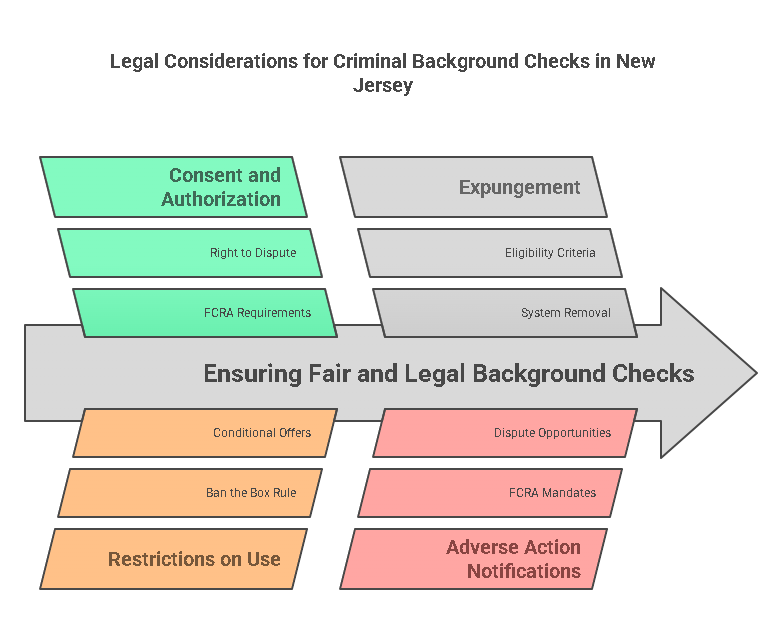
The use of criminal background checks is strictly regulated to ensure that individuals’ rights are protected and that decisions based on criminal history are made fairly and responsibly. In New Jersey, several laws and regulations govern the use of criminal records, and it is crucial for employers, landlords, and other organizations to be aware of these requirements.
1. Consent and Authorization
As mentioned previously, obtaining written consent from the individual undergoing the background check is mandatory. This is required under the Fair Credit Reporting Act (FCRA), which ensures that individuals are aware of and agree to the background check process. In New Jersey, this consent must be clear and specific, and the individual must be informed of their right to dispute any inaccuracies in their criminal history report.
2. Restrictions on the Use of Criminal Records
New Jersey imposes strict restrictions on how criminal records can be used in decisions related to employment, housing, and other opportunities. For example, under the New Jersey Opportunity to Compete Act (OTCA), which enforces the Ban the Box rule, employers are prohibited from asking about an applicant’s criminal history on initial job applications. Criminal history inquiries can only occur after a conditional offer of employment is made, ensuring that applicants are not prematurely judged based on their criminal record.
3. Expungement of Criminal Records
In New Jersey, individuals who have been convicted of certain crimes may apply for expungement, which removes their criminal records from public databases. Expunged records should not appear on background checks, and employers, landlords, and other entities are prohibited from using expunged records to make decisions.
It is important to note that not all criminal convictions are eligible for expungement. Violent offenses, certain drug-related offenses, and crimes that resulted in a lifetime sentence may be excluded from expungement eligibility. Additionally, expunged records must be completely removed from the system, and entities conducting background checks must be cautious not to consider these records when reviewing applicants.
4. Adverse Action Notifications
When an employer or landlord decides to take adverse action based on a criminal background check (e.g., not hiring a candidate or refusing a tenant application), they must notify the individual. The FCRA mandates that the individual be informed that the decision was based on their criminal history and provided an opportunity to dispute the results if necessary.
Frequently Asked Questions About Criminal Background Checks in New Jersey
What Types of Criminal Records Are Checked in New Jersey?
In New Jersey, a criminal background check typically includes information about:
- Arrests
- Convictions
- Pending charges
- Sex offender registry status
Criminal records related to offenses such as theft, fraud, assault, and drug-related crimes are included, but expunged records do not appear in the report. Additionally, arrest records without convictions may be reported, but New Jersey law prohibits discrimination based solely on arrests that did not result in conviction.
Can a Criminal Background Check Be Conducted Without the Person’s Consent?
No, criminal background checks in New Jersey cannot be conducted without the individual's consent. The FCRA requires written authorization from the individual before a background check can be initiated. Employers, landlords, and other entities must clearly inform the individual about the background check and the information that will be retrieved.
How Long Does It Take to Receive Results for a Criminal Background Check?
The length of time it takes to receive the results of a criminal background check depends on several factors, such as the method used to conduct the check and the scope of the inquiry. Generally, background checks in New Jersey can take anywhere from 3 to 5 business days for standard requests. However, more complex checks, such as those that involve multiple jurisdictions or require manual intervention, may take longer.
How Can an Individual Dispute Errors in Their Criminal Background Check?
If an individual believes there are errors in their criminal background check, they have the right to dispute the findings. In New Jersey, individuals can contact the agency that provided the report (such as the State Police or a third-party background check provider) to request a correction. If the error was made by a credit reporting agency, the individual can file a dispute directly with the agency, and they are required by law to investigate and resolve the issue within a certain time frame.
Are Criminal Background Checks Mandatory for All Employers in New Jersey?
While criminal background checks are not mandatory for all employers in New Jersey, they are required in certain industries, such as healthcare, childcare, and education, where employees may have access to vulnerable populations. Even when not required by law, many employers choose to conduct background checks to maintain a safe workplace and reduce the risk of hiring individuals with a criminal history that could negatively impact the organization.
Conclusion
Criminal background checks are a crucial tool for ensuring workplace safety, preventing fraud, maintaining legal compliance, and making informed decisions. In New Jersey, the process is governed by several state-specific laws that protect individuals’ rights while ensuring that businesses and landlords can properly evaluate applicants.
By understanding the legal considerations, requirements for consent, and restrictions on using criminal records, employers and landlords can avoid potential legal pitfalls and foster a fair and safe environment. Additionally, understanding the nuances of New Jersey’s expungement process and how it impacts background checks is essential for ensuring compliance.
Organizations looking to streamline their criminal background check process and ensure they are fully compliant with New Jersey’s regulations should consider using a professional service like PreciseHire. With years of experience in the background screening industry, PreciseHire helps businesses and organizations obtain accurate and timely criminal records, while staying compliant with New Jersey’s specific laws.
Whether you’re an employer, landlord, or organization, using reliable and efficient background check services will not only safeguard your business but will also provide peace of mind when making critical decisions related to hiring, tenant screening, or licensing.
Take action now and ensure your business stays compliant with New Jersey’s criminal background check laws by partnering with PreciseHire for your background screening needs. We’ll help you simplify the process and ensure you’re fully protected.
